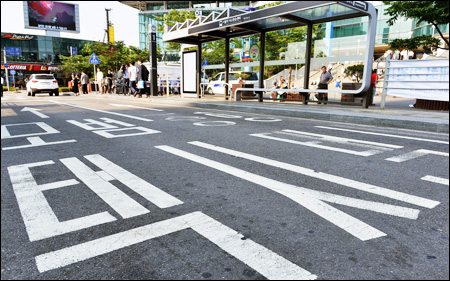Taxi drivers stage massive strike

A taxi stand in front of Seoul Station is empty as cabbies staged a massive strike, Wednesday. / Korea Times photo by Kim Joo-young
Cabbies threaten additional action in latter half
About nine out of 10 taxis were at a standstill Wednesday, as drivers staged a massive strike, calling for a pay rise and recognition of taxis as public transportation.
The drivers threatened to launch additional action in the latter half of the year if their demands are not met. But the government is not coming up with viable solutions.
Cabbies held the strike for 24 hours across the nation, keeping some 220,000 taxies belonging to 250 firms or operated by individuals in garages. Some 250,000 taxis are registered nationwide.
More than 30,000 drivers gathered at Seoul Plaza at 1 p.m. for a rally, blocking the downtown area in the afternoon. They demanded President Lee Myung-bak fulfill his campaign pledge to recognize taxis as public transportation and called for lower gas prices and higher basic fare.
“Taxis take up 47 percent of passenger transportation. But 300,000 cabbies and their families are suffering from unprecedented financial difficulties. The strike, staged by both drivers and taxi companies, shows the industry is facing a serious problem,” the taxi drivers’ groups said in a statement.
One of the rally participants, a 53-year-old Chae, said he makes about 900,000 won per month after paying fees he has to turn over to the taxi company. But gas costs some 400,000 won per month, so his actual monthly income is nearer 500,000 won.
“I work 12 hours per day and I want a payment that meets my time and effort. The price of gas is also part of the financial difficulties, as it has risen to 1,200 won per liter from 700 won four years ago when I started driving a taxi,” said Chae who mainly drives in northern Seoul.
“We need financial support from the central and local governments like buses, but they say they can’t help because taxis are not public transportation. Recognizing taxis as such is the key to solving the problem,” he said.
Officials of the Ministry of Land, Transport and Maritime Affairs said the government is considering raising the basic fare, which has remained the same for the last three years. “But other demands, such as recognizing taxis as public transportation, are unlikely,” an official said.
The striking drivers said if the government and the National Assembly don’t manage to solve the issue, they will hold another massive rally in October and stage a strike in December.
Following the walkout, buses and subways were crowded with people who had to find alternative means of transportation. Municipalities increased the frequency of buses and subways during rush hours. But some who didn’t know about the strike were late for work or school.
On Jeju Island, tourists were inconvenienced. A Jeju International Airport staffer said, “Visitors asked us what public transportation they should take. As we don’t have a subway on Jeju, some 40 employees here were busy providing them with bus numbers and routes.” <The Korea Times/Kim Rahn>

























































